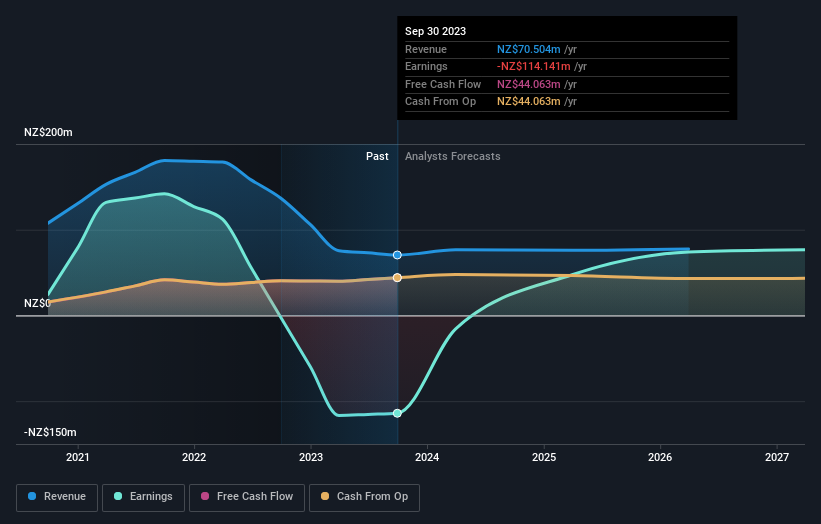Stride Property Group (NZSE:SPG) is favoured by institutional owners who hold 56% of the company
Key Insights
Given the large stake in the stock by institutions, Stride Property Group's stock price might be vulnerable to their trading decisions
A total of 7 investors have a majority stake in the company with 50% ownership
Ownership research along with analyst forecasts data help provide a good understanding of opportunities in a stock
If you want to know who really controls Stride Property Group (NZSE:SPG), then you'll have to look at the makeup of its share registry. We can see that institutions own the lion's share in the company with 56% ownership. Put another way, the group faces the maximum upside potential (or downside risk).
Because institutional owners have a huge pool of resources and liquidity, their investing decisions tend to carry a great deal of weight, especially with individual investors. As a result, a sizeable amount of institutional money invested in a firm is generally viewed as a positive attribute.
Let's delve deeper into each type of owner of Stride Property Group, beginning with the chart below.
View our latest analysis for Stride Property Group
What Does The Institutional Ownership Tell Us About Stride Property Group?
Many institutions measure their performance against an index that approximates the local market. So they usually pay more attention to companies that are included in major indices.
We can see that Stride Property Group does have institutional investors; and they hold a good portion of the company's stock. This can indicate that the company has a certain degree of credibility in the investment community. However, it is best to be wary of relying on the supposed validation that comes with institutional investors. They too, get it wrong sometimes. If multiple institutions change their view on a stock at the same time, you could see the share price drop fast. It's therefore worth looking at Stride Property Group's earnings history below. Of course, the future is what really matters.
Institutional investors own over 50% of the company, so together than can probably strongly influence board decisions. Stride Property Group is not owned by hedge funds. The company's largest shareholder is BlackRock, Inc., with ownership of 15%. Meanwhile, the second and third largest shareholders, hold 13% and 11%, of the shares outstanding, respectively.
We did some more digging and found that 7 of the top shareholders account for roughly 50% of the register, implying that along with larger shareholders, there are a few smaller shareholders, thereby balancing out each others interests somewhat.
Researching institutional ownership is a good way to gauge and filter a stock's expected performance. The same can be achieved by studying analyst sentiments. Quite a few analysts cover the stock, so you could look into forecast growth quite easily.
Insider Ownership Of Stride Property Group
The definition of company insiders can be subjective and does vary between jurisdictions. Our data reflects individual insiders, capturing board members at the very least. The company management answer to the board and the latter should represent the interests of shareholders. Notably, sometimes top-level managers are on the board themselves.
I generally consider insider ownership to be a good thing. However, on some occasions it makes it more difficult for other shareholders to hold the board accountable for decisions.
Our data suggests that insiders own under 1% of Stride Property Group in their own names. It has a market capitalization of just NZ$704m, and the board has only NZ$2.9m worth of shares in their own names. We generally like to see a board more invested. However it might be worth checking if those insiders have been buying.
General Public Ownership
With a 43% ownership, the general public, mostly comprising of individual investors, have some degree of sway over Stride Property Group. While this group can't necessarily call the shots, it can certainly have a real influence on how the company is run.
Next Steps:
I find it very interesting to look at who exactly owns a company. But to truly gain insight, we need to consider other information, too. Consider for instance, the ever-present spectre of investment risk. We've identified 3 warning signs with Stride Property Group (at least 1 which shouldn't be ignored) , and understanding them should be part of your investment process.
But ultimately it is the future, not the past, that will determine how well the owners of this business will do. Therefore we think it advisable to take a look at this free report showing whether analysts are predicting a brighter future.
NB: Figures in this article are calculated using data from the last twelve months, which refer to the 12-month period ending on the last date of the month the financial statement is dated. This may not be consistent with full year annual report figures.
Have feedback on this article? Concerned about the content? Get in touch with us directly. Alternatively, email editorial-team (at) simplywallst.com.
This article by Simply Wall St is general in nature. We provide commentary based on historical data and analyst forecasts only using an unbiased methodology and our articles are not intended to be financial advice. It does not constitute a recommendation to buy or sell any stock, and does not take account of your objectives, or your financial situation. We aim to bring you long-term focused analysis driven by fundamental data. Note that our analysis may not factor in the latest price-sensitive company announcements or qualitative material. Simply Wall St has no position in any stocks mentioned.


